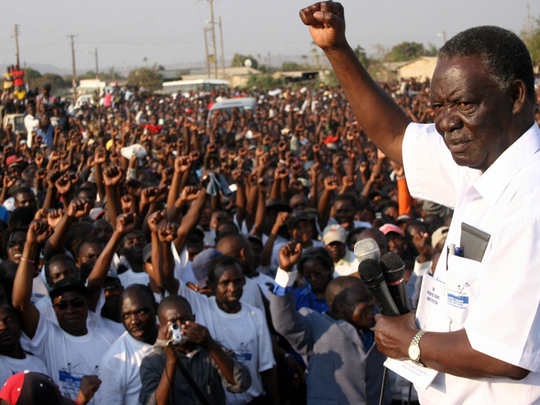
Lusaka: Zambia's government on Wednesday announced 77-year-old President Michael Sata had died in London of an unspecified illness, leaving behind questions about who will now lead the copper-rich African nation.
"It is with a heavy heart that I announce the passing on of our beloved president," government cabinet secretary Roland Msiska said in an address to the nation.
He called for Zambians to remain calm.
Sata, nicknamed "King Cobra" for his biting rhetoric, had ruled Zambia since elections in 2011.
Sata, whose attacks on foreign mining companies have sometimes rattled investors, died on Tuesday evening at London’s King Edward VII hospital, the Zambia Reports and Zambian Watchdog websites reported.
The cause of death was not immediately disclosed but Sata, who became president of the landlocked southern African nation in 2011, had been ill for some time.
Sata had not been seen in public since returning from the UN General Assembly last month, where he failed to make a scheduled speech.
He made a rare public appearance on September 19 to tell parliament: "I am not dead."
“As you are aware the president was receiving medical attention in London,” Msiska announced on state television.
“The head of state passed away on October 28. President Sata’s demise is deeply regretted.”
Sata is likely to be succeeded on an interim basis by Defence Minister Edgar Lungu, who stood in recently as acting president, or by Vice-President Guy Scott, who would become Africa’s first white head of state since South Africa’s FW de Klerk in 1994.
The constitution says a new presidential election must be held within 90 days. Most analysts say Scott is unlikely to run because of citizenship restrictions.
Zambia's former president Rupiah Banda told AFP he was shocked by the news of his successor's death.
"It's really sad considering we were not quite sure of how he was doing, but we have just heard about his passing on."
Sata's death prompted speculation about who may replace him before and after elections, which are expected within 90 days.
The Zambian kwacha fell 2 per cent against the dollar although traders said it was unlikely to suffer any prolonged weakness due to the underlying health of an economy expected to grow by seven per cent this year.
“Obviously there will be a sentimental temptation to go long on dollars, but I’m also quite confident the central bank will do everything it can to protect the currency,” one Lusaka-based trader said.
“In terms of the economy, everything should still be on track.”
Long before Sata's death, analysts had said a power struggle for Zambia's top job was already well under way.
Treatment
Sata flew to London just over a week ago for treatment, appointing Defence and Justice Minister Edgar Lungu as acting president.
It was not immediately clear if Lungu has now been replaced by Vice President Guy Scott, as stipulated in the Zambian constitution.
If confirmed, 70-year-old Scott - whose parents are Scottish - would be the first white person to lead an African country since FW de Klerk ruled apartheid South Africa.
Banda said Zambia went through similar uncertainty when president Levy Mwanawasa died abroad in 2008.
"We went through this in the past but we maintained peace and I hope we will remain peaceful."
African leaders paid tribute to Sata. Kenya's President Uhuru Kenyatta hailed Sata as an "outstanding son of Africa".
"He was gifted with unique, admirable abilities and strong values," he said in a statement.
Scorched earth politics
Sata's supporters saw him as a no-nonsense man of action, while for critics, the former policeman, trade unionist and taxidermist was an authoritarian populist.
What is undisputed is that he seemed to revel in scorched earth politics.
Sata rode to power on the back of resentment against the Chinese resource firms that dot Zambia, describing them as "infesters".
Detractors, political foes, the media and even allies frequently came under attack from a man who earned the sobriquet "King Cobra".
His government had recently cracked down on political opponents and critical journalists who reported on his long-suspected illness and frequent "working trips" abroad, apparently for medical treatment.
In January 2014, an opposition politician was charged with defamation for calling him a potato, while in June the authorities charged three opposition activists for claiming that he was dying.
Platform sweeper to president
Analysts said investors were unlikely to miss Sata’s often confrontational style of leadership.
“President Sata has been a divisive figure for Zambia on the economic front, espousing increasingly authoritarian and ad hoc policy measures against the crucial mining sector in recent years, which has hampered investment,” South African consultancy ETM said.
“The president’s passing could make way for a more reformist administration and help to remove broader policy uncertainties.”
Sata’s varied CV included stints as a policeman, car assembly worker, trade unionist and platform sweeper at London’s Victoria station.
He left Zambia on October 19 for medical treatment, accompanied by his wife and family members.
Lungu, secretary general of Sata’s Patriotic Front party, had to lead celebrations last week to mark the nation’s 50th anniversary of independence from Britain.
Concern over Sata’s health had been mounting since June when he disappeared from the public eye without explanation and was then reported to be receiving medical treatment in Israel.











